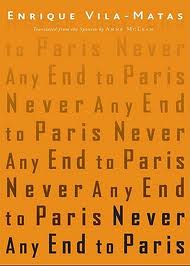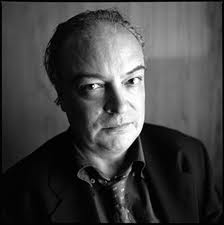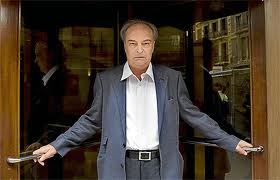In his electric and endearing fictional memoir, Never Any End to Paris, Enrique Vila-Matas mentions Andre Gide’s advice about autobiography: “An artist shouldn’t recount his life exactly as he’s lived it, but rather live it exactly as he is going to recount it.” But this sage-like counsel turns out to be practically useless to the wily Vila-Matas (b. 1948 in Barcelona), one of Spain’s greatest contemporary novelists. What exactly does “exactly” mean? Why would anyone pretend to record life “exactly” except to reflect credit on the writer’s memory or to flatter oneself?
 Presented as a quasi-absurd three-day lecture on his youthful days in Paris, Vila-Matas’ narrative hopes “not to overwhelm you with too much irony. The kind that I practice has nothing to do with that which arises from desperation – I was stupidly desperate enough when I was young. I like the kind of irony I call benevolent, compassionate, like what we find, for example, in the best of Cervantes. I don’t like ferocious irony but rather the kind that vacillates between disappointment and hope. OK?” He says that a recent trip to Paris with his wife has forever dismantled his belief in “the elegance of despair.” Insisting that he now resembles the bearded Hemingway (though no one else concurs), Vila-Matas shapes Never Any End to Paris into an homage to A Moveable Feast.
Presented as a quasi-absurd three-day lecture on his youthful days in Paris, Vila-Matas’ narrative hopes “not to overwhelm you with too much irony. The kind that I practice has nothing to do with that which arises from desperation – I was stupidly desperate enough when I was young. I like the kind of irony I call benevolent, compassionate, like what we find, for example, in the best of Cervantes. I don’t like ferocious irony but rather the kind that vacillates between disappointment and hope. OK?” He says that a recent trip to Paris with his wife has forever dismantled his belief in “the elegance of despair.” Insisting that he now resembles the bearded Hemingway (though no one else concurs), Vila-Matas shapes Never Any End to Paris into an homage to A Moveable Feast.
Built on an armature of life-facts and recollections, Never Any End to Paris digresses purposefully beyond them. From 1974 to 1976, Vila-Matas rented a garret in Paris from Marguerite Duras who lived in an apartment below. By that time he had already directed two short films and written his first novel. While in Paris, he wrote The Lettered Assassin (La asesina ilustrada), his second novel, which was published in 1977. But in Never Any End to Paris, Vila-Matas portrays his younger self as a first-time writer, unaccomplished and untutored. How will he create a recognizable style and write the great novels of his age?
 But very early in his “lecture,” Vila-Matas begins to draw the audience toward the answers. He remarks, “When I read something that I understand perfectly, I put it aside in disappointment. I don’t like stories with understandable plot lines. Because understanding can be a sentence. And not understanding, a door swinging open.” Disorderly and impulsive, the memoir does a better job of “exactly” describing the confusions and pretentions of a young writer than any conventional narrative could achieve. But more, Never Any End to Paris meditates on the life and career of writers, their enclosures and aloneness — and it enjoys gabbing about literary history.
But very early in his “lecture,” Vila-Matas begins to draw the audience toward the answers. He remarks, “When I read something that I understand perfectly, I put it aside in disappointment. I don’t like stories with understandable plot lines. Because understanding can be a sentence. And not understanding, a door swinging open.” Disorderly and impulsive, the memoir does a better job of “exactly” describing the confusions and pretentions of a young writer than any conventional narrative could achieve. But more, Never Any End to Paris meditates on the life and career of writers, their enclosures and aloneness — and it enjoys gabbing about literary history.
Marguerite Duras, his driven, solitary and perplexing landlord, may say as they pass each other in the stairwell, “I’ll never know why one writes and how one doesn’t write. In life, there comes a time, and I believe it’s absolute, from which we cannot free ourselves, when everything is called into question – to doubt is to write.”
 From his cramped quarters in Duras’ house, the young Vila-Matas prowls around the Latin Quarter, dispiritedly entertains a few women, joins his expatriate friends in the famous cafes, and records and questions the writerly advice everyone dishes out. He takes himself to lectures given by Borges and Perec – with cameo appearances in the neighborhood by Barthes, Kristeva, Burroughs, Beckett, Paloma Picasso, Sonia Orwell, Isabelle Adjani, Eduardo Mendoza, and Romain Gary. This is the moment of the demise of the Franco regime – but Vila-Matas finds politics “unattractive … a pastime ultimately demanding you choose between idealism and pragmatism, something that seemed not only rather dull but also repugnant.”
From his cramped quarters in Duras’ house, the young Vila-Matas prowls around the Latin Quarter, dispiritedly entertains a few women, joins his expatriate friends in the famous cafes, and records and questions the writerly advice everyone dishes out. He takes himself to lectures given by Borges and Perec – with cameo appearances in the neighborhood by Barthes, Kristeva, Burroughs, Beckett, Paloma Picasso, Sonia Orwell, Isabelle Adjani, Eduardo Mendoza, and Romain Gary. This is the moment of the demise of the Franco regime – but Vila-Matas finds politics “unattractive … a pastime ultimately demanding you choose between idealism and pragmatism, something that seemed not only rather dull but also repugnant.”
Recalling an LSD trip high up on the Eiffel Tower, he reflects on “opening up my visual field … Some of those perceptions of a distinct reality have lasted firmly and still today carry a highly remarkable charge, and are the reason I can laugh at realist writers, for example, who duplicate reality and so impoverish it.” (“Realism is a corruption of reality” – Wallace Stevens). To provide the density of the real is to give the reader something to do.
Never Any End to Paris comprises 113 numbered chapters, anecdotal, allusive, and apparently spontaneous. But Vila-Matas has his hand on all the puppet strings. Duras gives him a list of essential elements of the novel. But as he writes The Lettered Assassin, his own mode comes into focus. He says, “I’d been discovering it was highly debatable that a novel must have unity and harmony. For what about digressions then? I knew, or rather, sensed, that there were very good novels that were brilliant precisely because of their digressions. What’s more, I said to myself, a book was like a conversation. Did a conversation have to deal with the same subject, take the same form or follow the same intention for hours?”
He comes to admire “the immense capacity other people have for writing dangerously, that is, starting off, from the very first moment, from an extreme situation that forces the author not ever to lessen the tension with which he has begun the drama.” He enjoys “stories that were like essays and essays that were like stories” (the prime feature of his later novels like Bartleby & Co.). As he describes the emergence of his preferences, the reader experiences them in the form and flow of the memoir itself.
 Never Any End to Paris is both a very funny and wise book. In the end, The Lettered Assassin is finished and Vila-Matas returns to Barcelona and his skeptical family. His querulous mother had once told him, “One has to know how to swim just well enough to avoid having to save anyone else.” Vila-Matas more or less insists that the reader learn to swim for him/herself. But he creates such a constant current of authentic expression that one is carried away. His “fictional memoir” proves by example why most earnest, “exact” memoirs open no doors at all but rather wish to be celebrated as exploits of doors passed through.
Never Any End to Paris is both a very funny and wise book. In the end, The Lettered Assassin is finished and Vila-Matas returns to Barcelona and his skeptical family. His querulous mother had once told him, “One has to know how to swim just well enough to avoid having to save anyone else.” Vila-Matas more or less insists that the reader learn to swim for him/herself. But he creates such a constant current of authentic expression that one is carried away. His “fictional memoir” proves by example why most earnest, “exact” memoirs open no doors at all but rather wish to be celebrated as exploits of doors passed through.
Here’s how Vila-Matas ends chapter 67:
“I’m leaping to confess to all of you now that I feel lucky not to yearn for my years of writerly apprenticeship. Because if I could tell you that from those years I remember the intensity, those hours consumed writing in the garret, consumed all day long and then at night, bent over my desk while the world slept, without feeling tired, electrified, working till dawn. And even beyond … If I only I could tell you something like that, but the fact is I can’t, there’s not much nobility, beauty or intensity from these minutes of my youth spent writing. I know, it’s deplorable. But this is my fate, I life without nostalgia. I don’t yearn for my purity, or stimulating enthusiasm, or intensity. It’s as if in Paris I skillfully postponed everything in order to truly feel the seduction of writing in these current years, those of my later life.”
[Published by New Directions on May 17, 2011, 224 pages, $15.95 paperback original.]
Re: Never Any End To Paris
“If I only I could tell you something like that, but the fact is I can’t, there’s not much nobility, beauty or intensity from these minutes of my youth spent writing. I know, it’s deplorable. But this is my fate, my life without nostalgia. I don’t yearn for my purity, or stimulating enthusiasm, or intensity. It’s as if in Paris I skillfully postponed everything in order to truly feel the seduction of writing in these current years, those of my later life.”
Many thanks for a wonderful review of what sounds like a wonderful book.
I suppose this apprenticeship lasts as long as a life does.
Sure, not very much of nobility, from time to time a touch of nostalgia though, and of a few stimulating enthusiasms along the way. In our later life we must perforce look ahead, as we ignore the blank walls of the past, and the obdurate memories that we failed to invoke well enough.
Thank you for the review,
Thank you for the review, Ron. Nicely done.
During my undergraduate education I can recall how I felt about studying politics, but I could never sum up those feelings quite as perfectly as Vila-Matas:
“unattractive … a pastime ultimately demanding you choose between idealism and pragmatism, something that seemed not only rather dull but also repugnant.”
Brilliant! Looking forward to giving this a read.